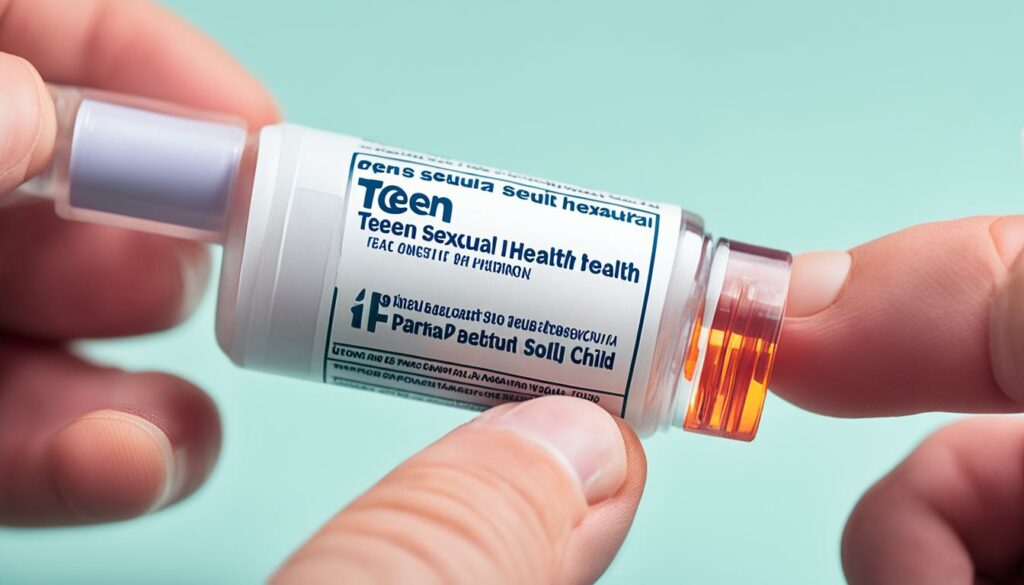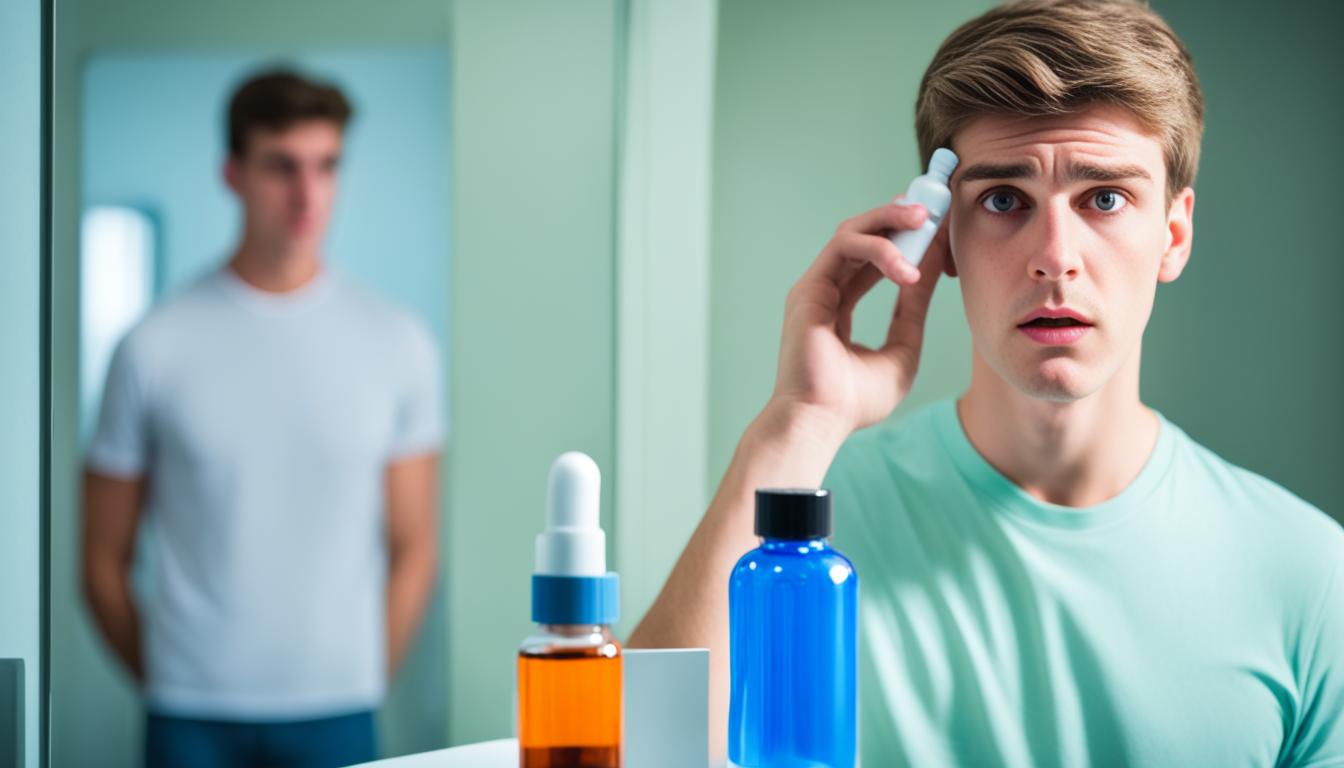Can Teens Take Viagra? Essential Safety Guide
Viagra, a widely known medication used to treat erectile dysfunction (ED) in adult men, is not approved for use in teenagers. This article aims to provide an essential safety guide regarding teenage Viagra use. It is crucial for teenagers and their parents to understand the potential risks and concerns associated with using Viagra without appropriate medical guidance.
Key Takeaways:
- Viagra is not recommended or approved for use in teenagers.
- Teenagers should prioritize healthy lifestyle choices and open communication with healthcare providers regarding sexual health concerns.
- Comprehensive sex education plays a crucial role in equipping teenagers with the knowledge and skills necessary to make informed decisions.
- Parents have a critical role in providing accurate information and guidance about sexual health.
- Obtaining Viagra without a prescription is risky, illegal, and can pose serious health hazards.
How Viagra Works for Erectile Dysfunction
Viagra, a medication commonly prescribed for the treatment of erectile dysfunction (ED) in adult men, works by inhibiting the enzyme phosphodiesterase type-5 (PDE5). This enzyme is responsible for breaking down a chemical called cyclic guanosine monophosphate (cGMP) in the body. By inhibiting PDE5, Viagra allows cGMP to accumulate in the penis, leading to increased blood flow and an erection.
While this mechanism of action is effective for treating ED in adult men, it is important to note that Viagra is not appropriate for teenagers who do not have a medical need for the drug. As such, it is not recommended for adolescent use.
Furthermore, the potential side effects of Viagra, such as headache, flushing, and dizziness, can be more pronounced in younger individuals. This heightened susceptibility to side effects necessitates caution and a careful evaluation of the risks versus benefits in this age group.
It is crucial for teenagers and their parents to understand that Viagra is not a recreational or performance-enhancing drug, and its use should only be considered under the guidance of a healthcare professional.
Potential Risks of Teen Viagra Use

The use of Viagra in teenagers can pose several risks. Firstly, there is a lack of research on the safety and efficacy of the drug in this age group. The long-term effects of using Viagra during adolescence are unknown. Additionally, teenagers may be more susceptible to the side effects of the drug. Viagra can lower blood pressure and interact with certain medications, which may be more concerning in younger individuals with developing cardiovascular systems.
It is important for teens and their parents to understand that Viagra is not a recreational or performance-enhancing drug and should only be used under the guidance of a healthcare professional.
- Lack of research on efficacy and safety in teens
- Unknown long-term effects
- Increased susceptibility to side effects
- Potential interactions with other medications
- Lowering of blood pressure
- Importance of guidance from healthcare professionals
Teenagers should be aware of the risks involved in taking Viagra without medical supervision. It is crucial for them to prioritize their well-being and consult healthcare professionals for appropriate advice and guidance.
“Viagra is not a recreational or performance-enhancing drug. It should only be used under the guidance of a healthcare professional.”
Alternative Options for Teenage Sexual Health

While Viagra is not recommended or approved for use in teenagers, there are alternative options available for teenage sexual health. It is important for teenagers to focus on maintaining a healthy lifestyle and engaging in open communication with their healthcare provider to address any sexual health concerns.
Here are some safer alternatives to Viagra for teenagers:
1. Practice Safe Sex
Using condoms and other barrier methods can help prevent sexually transmitted infections (STIs) and unintended pregnancies. It is crucial for teenagers to understand and practice safe sex to protect their sexual health.
2. Maintain a Balanced Diet
A nutritious diet is essential for overall health, including sexual health. Consuming a variety of fruits, vegetables, whole grains, and lean proteins can support hormone production and improve sexual function.
3. Regular Exercise
Engaging in regular physical activity promotes blood circulation, reduces stress, and enhances overall well-being. Exercise can also increase libido and improve sexual satisfaction.
4. Stress Management
Stress can have a negative impact on sexual health. Teenagers should learn healthy coping mechanisms, such as deep breathing exercises, meditation, or seeking support from a counselor or therapist, to manage stress effectively.
5. Seek Counseling or Therapy
If teenagers are experiencing sexual difficulties or have concerns about their sexual health, seeking counseling or therapy can provide them with a safe and supportive space to discuss their feelings and receive professional guidance.
“It is important for teenagers to explore healthier alternatives to Viagra and prioritize their overall sexual well-being.”
Teenagers should feel comfortable discussing their sexual health concerns with a healthcare professional who can provide appropriate guidance and support. By adopting a holistic approach to sexual health, teenagers can make informed decisions and prioritize their well-being.
Importance of Comprehensive Sex Education

Comprehensive sex education is vital in providing teenagers with the knowledge and skills they need to make informed decisions about their sexual health. By covering a wide range of topics, such as consent, contraception, sexually transmitted infections (STIs), and healthy relationships, comprehensive sex education ensures that teenagers have access to comprehensive information regarding their sexual well-being.
Through comprehensive sex education programs, teenagers learn about the importance of consent and the boundaries that should be respected in any sexual relationship. They also receive vital information about various contraceptive methods and their effectiveness in preventing unwanted pregnancies and STIs.
Furthermore, comprehensive sex education provides teenagers with the knowledge and skills to identify and prevent the spread of STIs. By educating them about safe sexual practices, such as the proper use of condoms and getting regular STI screenings, comprehensive sex education empowers teenagers to take responsibility for their sexual health.
Healthy relationships are another critical topic covered in comprehensive sex education. Teenagers learn about communication skills, respect, and the importance of setting boundaries in relationships. They are equipped with the knowledge to recognize signs of an unhealthy relationship and seek help when needed.
Overall, promoting comprehensive sex education in schools and within families plays a fundamental role in ensuring teenagers have the information they need to make responsible choices about their sexual health. Empowering them with this knowledge sets the foundation for a healthier and safer future.
Parental Guidance and Support

When it comes to the sexual health of teenagers, parents play a crucial role in providing guidance and support. Open and honest communication is key, as it allows parents to provide accurate information and guidance about important topics, including the use of Viagra or any other medication without a prescription. By creating a safe and non-judgmental space, parents can encourage their teens to ask questions and express their concerns without fear.
Parents should take the initiative to discuss the potential risks and consequences of using Viagra without a prescription. It’s important to emphasize that Viagra is a prescription medication intended for the treatment of erectile dysfunction in adult men and not recommended for teenagers. By explaining the potential risks and the importance of seeking medical advice, parents can help their teens make informed decisions regarding their sexual health.
“As parents, we have a responsibility to ensure our teenagers have accurate information about their sexual health. Open and honest discussions can provide guidance and support to help them make responsible choices.”
In addition to discussing the risks of using Viagra, parents should also encourage their teens to consult a healthcare professional before making any decisions regarding their sexual health. Healthcare providers can provide accurate information, assess their specific circumstances, and offer safer and more appropriate treatment options if needed.
By actively engaging in conversations and offering guidance, parents can help their teens develop a healthy attitude towards their sexual health, fostering responsible decision-making and overall well-being.
The Importance of Parental Involvement
Parental involvement in teen sexual health is crucial for several reasons. Firstly, it helps establish a foundation of trust between parents and teens, creating an environment where open communication thrives. This trust enables teenagers to feel comfortable seeking advice from their parents and turning to them for support when faced with challenging situations.
Secondly, parental involvement allows parents to provide accurate information and address any misconceptions or myths about sexual health. By debunking myths and providing factual information, parents can help their teens make informed choices and develop a healthy understanding of their bodies and relationships.
Lastly, parental guidance and support contribute to the overall well-being of teenagers. By discussing sexual health openly, parents can help their teens develop a positive body image, promote healthy relationships, and foster self-confidence and self-respect.
Talking to Teens About Viagra: Strategies for Effective Communication
When addressing the topic of Viagra with teenagers, it’s important to approach the conversation with sensitivity and empathy. Here are some strategies for effective communication:
- Choose the right time and place: Find a comfortable and private setting where your teenager feels safe to engage in an open conversation.
- Listen actively: Give your teen the opportunity to express their thoughts, feelings, and concerns without interruption. Validate their emotions and show empathy.
- Use age-appropriate language: Tailor your language and explanations to suit your teen’s level of understanding.
- Provide accurate information: Offer factual information about Viagra, its intended use, and potential risks, highlighting the importance of following prescribed guidelines and seeking medical advice.
- Encourage questions: Create a non-judgmental environment that encourages your teen to ask questions and seek clarification.
Remember, open and ongoing communication is key to ensuring your teen’s sexual health is supported. By being available, understanding, and informative, parents can help their teens navigate the complexities of their sexual health journey.
| Benefits of Parental Guidance and Support | Strategies for Effective Communication |
|---|---|
| Establishes trust between parents and teens | Choose the right time and place |
| Provides accurate information about sexual health | Listen actively |
| Fosters a positive body image and self-confidence | Use age-appropriate language |
| Promotes healthy relationships | Provide accurate information |
| Supports responsible decision-making | Encourage questions |
Risks of Obtaining Viagra Without a Prescription
Obtaining Viagra without a prescription, whether through online sources or other means, is risky and illegal. The counterfeit and unregulated nature of these products can pose serious health hazards. Adolescents should be educated about the dangers of buying Viagra online or from unverified sources. It is crucial to emphasize the importance of seeking medical advice for any health concerns and to avoid self-medicating without professional guidance.
Importance of Healthcare Provider Guidance
If a teenager is facing issues with erectile dysfunction and believes they may have a legitimate medical need for treatment, it is crucial for them to consult a healthcare provider. Seeking professional guidance ensures that the teenager receives appropriate care tailored to their specific circumstances. A doctor can assess their condition, conduct necessary tests, and provide expert advice on the best course of action.
When discussing sexual health concerns, including the use of medications like Viagra, open communication with a healthcare provider is key. Adolescents should feel comfortable discussing their questions, fears, and any potential treatment options. Healthcare providers have the knowledge and experience to guide teenagers through this journey and provide the necessary support at all stages.
A healthcare provider can also screen for any underlying health conditions that may contribute to erectile dysfunction in teenagers. It is important to address the root causes rather than solely focusing on symptom management. By identifying any contributing factors, such as hormonal imbalances or psychological issues, the healthcare provider can provide a more comprehensive approach to treatment.
Engaging in a conversation about Viagra with a healthcare provider ensures that teenagers receive accurate information, understand the potential risks and benefits, and explore alternative treatment options if necessary. It also helps prevent misuse and the potential for adverse effects due to self-medication.
“Consulting a healthcare provider is essential in order to receive personalized guidance, explore alternative treatment options, and ensure the teenager’s overall well-being.”
Benefits of Healthcare Provider Guidance for Teenagers:
- Access to accurate and reliable information
- Assessment of individual circumstances and needs
- Screening for underlying health conditions
- Exploration of alternative treatment options
- Prevention of medication misuse or self-medication
- Ongoing support throughout the treatment process
Consulting a healthcare provider is an essential step in prioritizing teenager’s sexual health and ensuring they receive the appropriate care and guidance they need. By working together, teenagers, parents, and healthcare providers can address any concerns, explore treatment options, and promote overall well-being.
| Benefits of Healthcare Provider Guidance for Teenagers: |
|---|
| Access to accurate and reliable information |
| Assessment of individual circumstances and needs |
| Screening for underlying health conditions |
| Exploration of alternative treatment options |
| Prevention of medication misuse or self-medication |
| Ongoing support throughout the treatment process |
Promoting Healthy Attitudes Towards Sexuality
Promoting a healthy attitude towards sexuality is crucial for teenagers to develop a positive and responsible approach to sexual health. By fostering open-mindedness, respect, consent, and understanding, we can provide them with the knowledge and skills needed to navigate relationships and make informed decisions.
Encouraging discussions about healthy relationships, boundaries, and self-esteem is an essential part of promoting healthy sexuality in teens. These conversations can help teenagers establish clear communication, recognize and respect personal boundaries, and develop a positive body image.
A sex-positive approach emphasizes the importance of consent, mutual pleasure, and safe sexual practices. It aims to reduce stigma, shame, and judgment around sexuality, empowering teenagers to explore their identities and desires in a safe and healthy manner.
“Sexuality is a natural and normal part of being human. It’s essential to provide teenagers with accurate information, support, and resources to promote a healthy and positive understanding of their own sexuality.”
Comprehensive sex education, both in schools and within families, plays a vital role in fostering healthy attitudes towards sexuality. By equipping teenagers with the knowledge and skills necessary to make informed choices, we can empower them to have fulfilling and safe sexual experiences.
Talking Points About Healthy Sexuality:
- Consent: Teach the importance of consent, boundaries, and mutual respect in intimate relationships.
- Safe Sex Practices: Educate on methods of contraception and prevention of sexually transmitted infections.
- Body Positivity: Encourage a positive body image and self-acceptance.
- Gender and Sexual Diversity: Emphasize the acceptance and understanding of diverse sexual orientations and gender identities.
- Mental and Emotional Well-being: Discuss the importance of emotional intimacy, communication, and self-care in sexual relationships.
Conclusion
While Viagra is an effective treatment for erectile dysfunction in adult men, it is not recommended or approved for use in teenagers. Instead, teenagers should focus on healthy lifestyle choices, comprehensive sex education, open communication with their healthcare provider, and parental guidance and support.
It is essential to prioritize the well-being of teenagers and provide them with accurate information and resources to make responsible decisions regarding their sexual health. Adolescence is a critical period of physical and emotional development, and it is important for teenagers to have access to the right guidance and support systems.
By emphasizing comprehensive sex education and promoting open dialogue, we can equip teenagers with the knowledge and skills they need to make informed decisions about their sexual health. Parents play a crucial role in this process, and it is important for them to create a safe and non-judgmental space for their teens to ask questions and seek guidance.
With the right resources, support, and education, teenagers can navigate their sexual health journey with confidence and responsibility. Let’s empower our teenagers by providing them with the tools they need to prioritize their well-being and make informed choices.
FAQ
Can teenagers take Viagra?
No, Viagra is not approved for use in teenagers. It is intended for adult men with erectile dysfunction and appropriate studies have not been conducted to determine its safety and effectiveness in teenagers.
How does Viagra work for erectile dysfunction?
Viagra works by increasing blood flow to the penis, helping to achieve and maintain an erection. It inhibits the enzyme phosphodiesterase type-5 (PDE5), which allows the chemical cyclic guanosine monophosphate (cGMP) to accumulate in the penis, leading to increased blood flow and an erection.
What are the potential risks of teen Viagra use?
The use of Viagra in teenagers can pose several risks. Firstly, there is a lack of research on the safety and efficacy of the drug in this age group. Additionally, teenagers may be more susceptible to the side effects of the drug, such as headache, flushing, and dizziness. Viagra can also lower blood pressure and interact with certain medications, which may be more concerning in younger individuals with developing cardiovascular systems.
What are the alternative options for teenage sexual health?
Instead of using Viagra, teenagers should focus on healthy lifestyle choices and open communication with their healthcare provider. This includes practicing safe sex, maintaining a balanced diet, exercising regularly, managing stress, and seeking counseling or therapy if needed.
What is the importance of comprehensive sex education for teenagers?
Comprehensive sex education plays a crucial role in equipping teenagers with the knowledge and skills necessary to make informed decisions about their sexual health. It should encompass a wide range of topics, including consent, contraception, sexually transmitted infections (STIs), and healthy relationships.
How can parents provide guidance and support for their teenager’s sexual health?
Parents have a critical role to play in supporting their teenager’s sexual health. Open and honest communication is essential, as it allows parents to provide accurate information and guidance. Creating a safe space for teens to ask questions and express concerns is important, as is discussing the potential risks and consequences of using Viagra or any other medication without a prescription.
What are the risks of obtaining Viagra without a prescription?
Obtaining Viagra without a prescription, whether through online sources or other means, is risky and illegal. The counterfeit and unregulated nature of these products can pose serious health hazards. Adolescents should be educated about the dangers of purchasing medications from unverified sources and the importance of seeking medical advice for any health concerns.
Why is it important to consult a healthcare provider regarding teen sexual health?
If a teenager has a legitimate medical need for erectile dysfunction treatment, it is essential for them to consult a healthcare provider. A doctor can assess the individual’s specific circumstances and provide appropriate guidance. They can also screen for any underlying health conditions that may be contributing to the issue and offer safer and more effective treatment options.
How can we promote healthy attitudes towards sexuality in teenagers?
Promoting a healthy attitude towards sexuality involves fostering open-mindedness, respect, consent, and understanding. Encouraging discussions about healthy relationships, boundaries, and self-esteem can contribute to a positive and responsible approach to sexual health.
Is it safe for teenagers to use Viagra?
No, it is not safe for teenagers to use Viagra. While Viagra is an effective treatment for erectile dysfunction in adult men, it is not recommended or approved for use in teenagers. Teenagers should prioritize their sexual health through healthy lifestyle choices, comprehensive sex education, open communication with their healthcare provider, and parental guidance and support.





